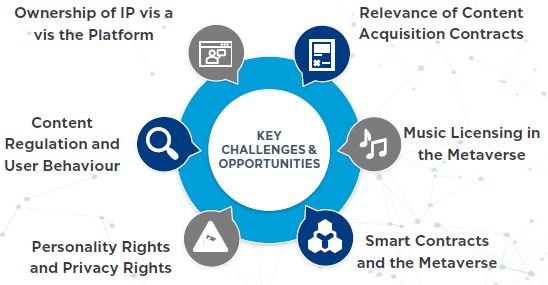Given that metaverse is ultimately a virtual projection of real things, every service or experience offered in the metaverse in effect relies on underlying digital content – whether in the form of images, sounds, videos, characters, visual effects, text, software, design, or a combination of all.
The regulatory landscape governing digital content and intellectual property is the primary legal regime for the governance and growth of content in the metaverse. However, there continue to be rising concerns on the effectiveness of our existing legal regime that struggles to cope with the once-unthinkable use and dependence on technology for consumption of content and user interaction. Let's gaze into the crystal ball and discuss the key challenges and opportunities we foresee.
KEY CHALLENGES & OPPORTUNITIES

1. Ownership of IP vis a vis the Platform
- Territorial scope for legal protection of IP in virtual context & absence of jurisdictional boundaries
- Identifying location of IP use and applicable jurisdictional legal regime could be a challenge
- Content created using AI on metaverse platforms may be owned by host platform instead of solely the creator
- Creating a separate category for AI generated IP – a possible solution
- Better traceability and technological controls to identify IP rights violations in the virtual space could be a positive outcome
2. Relevance of Content Acquisition Contracts
- Under the Indian copyright law, exploitation rights cannot be assigned for modes and mediums not existing at the time of assignment
- Use and monetisation of content acquired prior to contemplation of metaverse could be open to challenge by authors and original owners
- Existing contracts for acquiring content will need re-evaluation with respect to use of the content of metaverse platforms
- New content licenses will need careful drafting and negotiating to safeguard against exploitation of content on the metaverse or any new technology.
- Flexibility to revisit contracts and determine commercial consideration as and when new use-cases arise is key
3. Music Licensing in the Metaverse
- Music licensing arrangements will be heavily negotiated on manner, scope of use, modes and medium of exploitation
- Existing categories of licenses may not blend and overlap on a metaverse platform, ex: a virtual concert falls in both public performance and streaming categories
- Usage of music synchronised to visuals/ digital imagery could require a synchronisation license
- New and hybrid forms of licenses will surface to cater to changing needs and uses of these platforms
4. Smart Contracts and the Metaverse
- Smart contracts, i.e. digital contracts stored on blockchain technology and automatically executed when certain terms are met, will increase
- Enforcement of smart contracts is easier as blockchain technology clearly records all actions/ terms
- Initially, smart contracts are likely to be used for standardised agreements with human intervention still required for bespoke contracts
5. Personality Rights and Privacy Rights
- Personality rights that protect an individual's name, likeness, voice etc become more significant in the metaverse, given the different ways in which an "avatar" may be used in a digital ecosystem.
- Exploitation of personality rights through the metaverse will be a major revenue stream for celebrities and public personalities
- Personalities must be cautious regarding rights they grant to metaverse platforms
- Question of third parties using celebrities' digital avatars may lead to challenges
- Privacy laws may need swift redesigning in this context
6. Content Regulation and User Behaviour
- Content takedowns in the metaverse may not always be practical, particularly in relation to live interaction of virtual avatars
- Possibility of assault or harassment in the virtual environment, safety of minors, possibility of identity theft, fraud etc. are concerns that must be addressed
- Current regime relating to digital media may not suffice for regulating metaverse; laws will have to evolve to ensure creation of a safe environment for users.
- Platforms will likely be required to implement active measures, such as content monitoring and safety tools for users.
- Some platforms have proposed shared governance with users, where users will have voting rights in matters of governance
The content of this document do not necessarily reflect the views/position of Khaitan & Co but remain solely those of the author(s). For any further queries or follow up please contact Khaitan & Co at legalalerts@khaitanco.com


